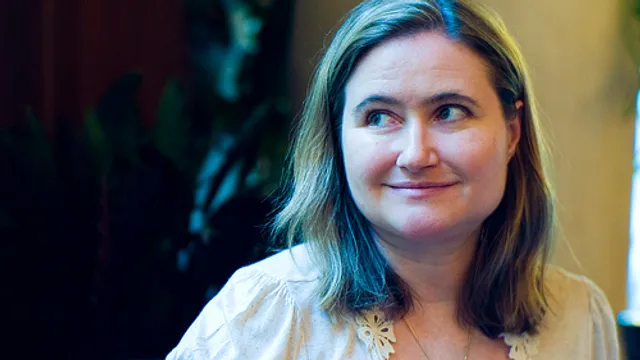Webspecial: Rebecca MacKinnon

In her ongoing struggle to democratize the Internet Rebecca MacKinnon has earned her stripes. As a former CNN Bureau Chief and current director of Global Voices, she has undertaken various efforts to lift the worlds Internet users from virtual serfdom to citizenship. In this interview, MacKinnon talks to us about the importance of citizen media, internet surveillance in China and Russia and the implications of new laws that may restrict Internet freedom.
Rebecca MacKinnon is at the forefront of the struggle for a free and democratic Internet. A former CNN Beijing and Tokyo Bureau Chief, MacKinnon is now co-founder of Global Voices, a community of bloggers and translators whose official mission is to "aggregate, curate, and amplify the global conversation online - shining light on places and people other media often ignore." In the meantime the website has grown to include a large list of bloggers from all over the world. She is a Senior Fellow at the New America Foundation, where she conducting research, writing and advocacy on global Internet policy, free expression, and the impact of digital technologies on human rights. She also serves on the Boards of Directors of the Committee to Protect Journalists and the Global Network Initiative.

Evgeny Morozov: het einde van de internet-utopie
de aflevering bij de bijlage
We are citizens of these digital spaces, not just users. If you just think of yourself as a user, you are no better than a medieval serf.
The future of the Internet
In her book Consent of the Networked: The Worldwide Struggle For Internet Freedom (2012), MacKinnon looks at the big questions surrounding the future of the Internet. As we are becoming increasingly dependent on it for different aspects of our lives, she argues for a democratization of cyberspace. We need to think about the roles of companies, governments and citizens in regulating and controlling the Internet.
Interview
In the following interview, MacKinnon talks to us about the importance of citizen media, internet surveillance, the accountability of private companies and democracy, amongst other things.
Interview with Rebecca MacKinnon Part 2/5:
Internet surveillance in China and Russia
Interview with Rebecca MacKinnon Part 3/5:
Democratizing cyberspace and the implications of SOPA
Interview with Rebecca MacKinnon Part 4/5:
Facebook
Interview with Rebecca MacKinnon Part 5/5:
Towards a free Internet, from serfdom to citizenship

Google versus China
De nieuwe geopolitieke arena is informatie. De Chinese overheid heeft dit goed begrepen en blokkeert Facebook, Youtube en Twitter.

Google & the Great Firewall of China
In januari 2010 werden de Chinese autoriteiten door Google beschuldigd van het inbreken in Gmail accounts. Na een discussie waarin zelfs Hillary Clinton zich mengde, besloot Google het land te verlaten.

Gonggrijp en WikiLeaks

EU bemoeilijkt internetcensuur in dictaturen
Westerse bedrijven leveren al jaren technologie waarmee autoritaire regimes hun burgers kunnen onderdrukken. Met een nieuwe wet wil de EU dat moeilijker maken.

Unlike Poetin. Ruslands Facebook-oppositie
Vladimir Poetin won in maart opnieuw de Russische presidentsverkiezingen, mede omdat hij de traditionele media voor zijn concurrenten gesloten wist te houden.
Maar op sociale media als Facebook, Twitter en Youtube ontstond een parallel mediaverkeer dat zijn weerga niet kende. Hierdoor gingen duizenden Russen de straat op en drong zich een heel ander beeld op van de verkiezingen.

Wie is wie in de Russische oppositie?
In de uitzending 'Unlike Poetin. Ruslands Facebook-oppositie' komen we verschillende sleutelfiguren uit de Russische oppositie tegen. Om het overzicht te houden is hier een kort "smoelenboek". Wie is wie in de Russische oppositie?

Chinese blogger Andy Yee schrijft voor Tegenlicht
Chinese blogger Andy Yee schrijft onder andere voor de blogwebsite Globalvoices. Speciaal voor Tegenlicht heeft hij een blogpost geschreven over het onderwerp "Wat denkt China?"